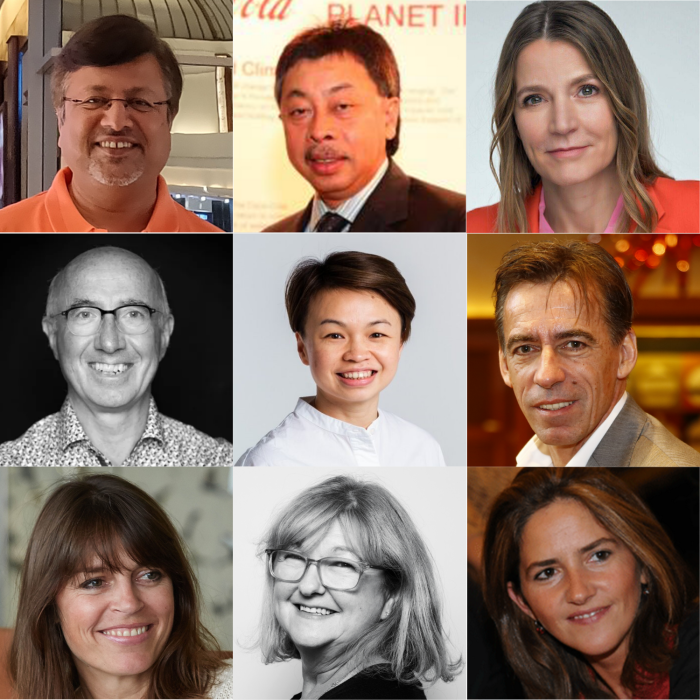Get analysis, insight & opinions from the world's top marketers.
Sign up to our newsletter.
The pandemic has changed everything but what new priorities, behaviours or ways of working from the last two years would jury members for the Global Marketer of the Year retain for the future?

Clockwise, in alphabetical order: Atul Agrawal (Tata), Mohamed Kadri Mohamed Taib (MAA, Malaysia), Susanne Kunz (OWM, Germany), Stephan Loerke (WFA), Eloísa Moscardó (Santander Group), Debbie Morrison (Ebiquity), Lucinda Peniston-Baines (The Observatory International), Jonathan Turner (OxfordSM), and Amanda Woo (AirAsia)
Amanda Woo, CEO at AirAsia Super App, says the very best thing marketers can learn from the last two years is the importance of understanding what they and their brands add to consumers’ lives and seek to enhance the perception of that value.
“In this pandemic, consumers’ resources (time and money) are limited. Consumers need to know that their dollars spent are adding value to their lives, irrespective of the nature of that value (savings, quality of life, convenience…). The key messages need to bank on “what my product/service means to you as a person”, rather than “why my product is unique/better than competitors,” she says.
The lesson of greater empathy is echoed by Atul Agrawal, Senior Vice President – Corporate Brand and Marketing at Tata, who adds: “Our industry needs to be empathetic in communication and approach yet embrace the evolving needs and provide solutions as business but without excessive profiteering motive.”
Mohamed Kadri Mohamed Taib, President of the Malaysian Advertisers Association (MAA), argues that the lessons to be learned are that consumers can change and the industry should encourage that.
“The pandemic has pushed consumers out of their normal routines. Consumers are adapting new habits and behaviours that many anticipate will continue in the long term. The industry should be agile and flexible in order to respond to the new norms. For example, take an increasing focus on a ‘healthy strategy’ like consumers are working from home, online shopping and communicating virtually,” he says.
One of the big changes of the pandemic is how quickly things can change and how swiftly even the biggest brand owners can move when they have to. Lucinda Peniston-Baines, Co-founder and Managing Partner at The Observatory International, argues that the ability to make rapid changes should be retained.
“The pandemic has caused every marketer and agency to think differently, drive forward their digital agendas and have an openness to innovation and risk-taking. Whilst it has proven challenging, it has also demonstrated an unbowed attitude and new ways of working that should be capitalised on,” she says.
That’s a big lesson too for Stephan Loerke, CEO of the WFA, arguing that the pandemic forced the industry to address some long-ignored problems, notably the lack of diversity and inclusion in the industry.
“We like to think of ourselves as a cool, future-facing profession – we’re not. I’m heartened to see how the awareness of the problem in our industry has risen dramatically. And change is on its way – both at a company level as well as across the industry. My hope is that we build on this momentum and make marketing ‘a force for good and a force for growth’ – to quote P&G’s Marc Pritchard,” he says.
For Eloísa Moscardó, Head of Corporate Advertising and Content, Santander Group, the pandemic has taught the world how vulnerable society and businesses alike are: "Many brands have been resilient and have provided optimism and support to society. Now we have the challenge of working in order to recover people's trust."
More flexible working is a big win for Debbie Morrison, Managing Director Global Partnerships & Events at Ebiquity. She says retaining hybrid models of working, which are no longer tied to the office and where working from home is no longer seen as the soft option, could boost the industry.
“I’d very much like to see organisations on all sides of the industry continue to capitalise on this greater fluidity and flexibility. Hybrid models of working empower employees, make the industry more human and attractive, open up to borderless talent and acknowledge that people have lives outside work,” she says.
In this she’s supported by Susanne Kunz, Managing Director at the German Advertisers Association (OWM), who says: “New ways of working, with mobile offices, offer tremendous opportunities for us as an industry to attract and grow talent nationally and around the globe. Without top talents in our industry, our development potential will not be at its peak. Therefore, it is essential that we foster and growing the new ways of working.”
One final learning from the lockdowns and extended period of working from home in 2020 and 2021 is the ability to limit our travel and environmental impact.
Jonathan Turner, Chairman at OxfordSM, says it’s vital that agencies and advertisers keep business travel low and stay virtual as much as possible and “continue making commercials in ways that are pragmatic, and more sustainable”.